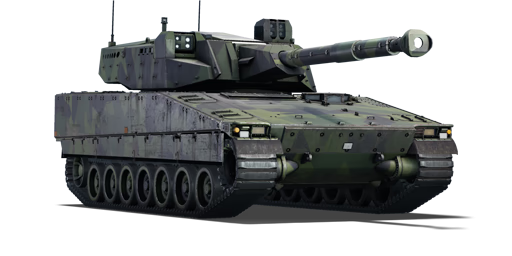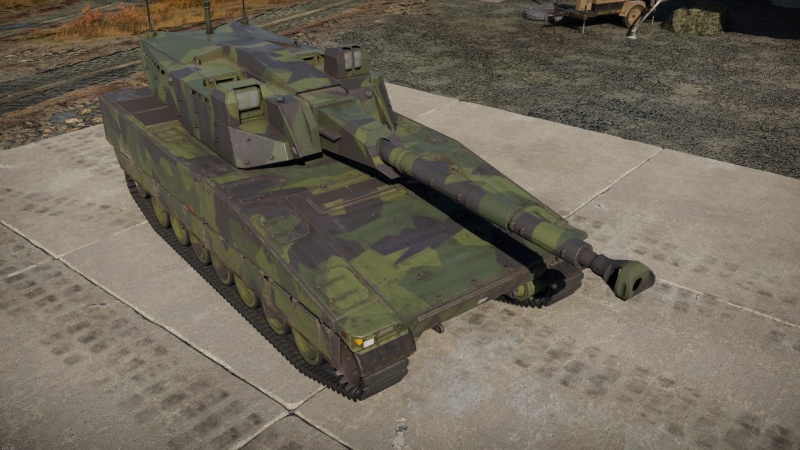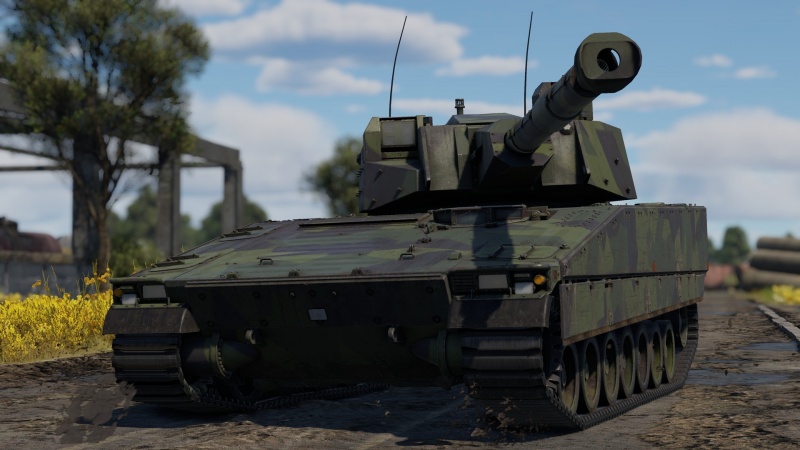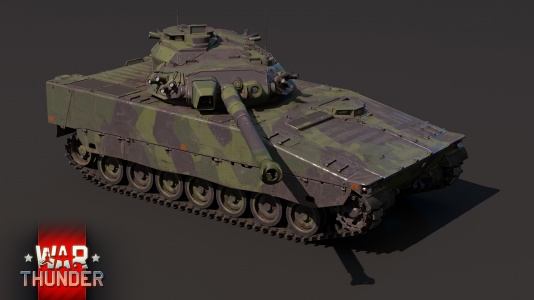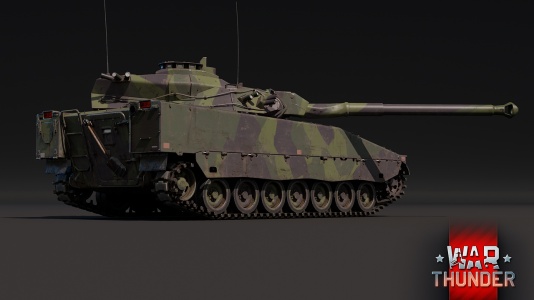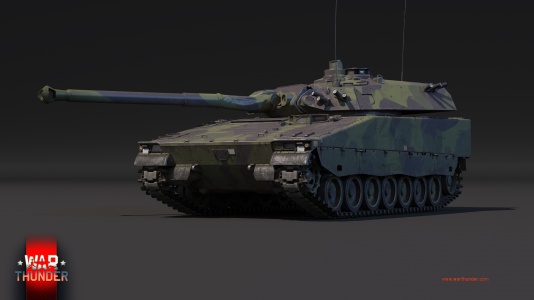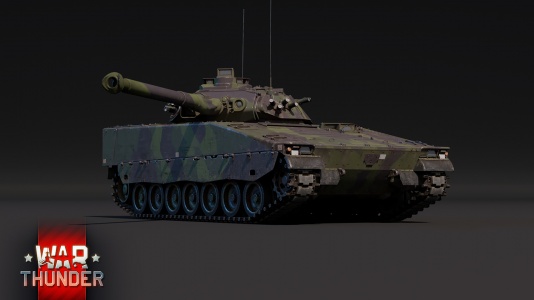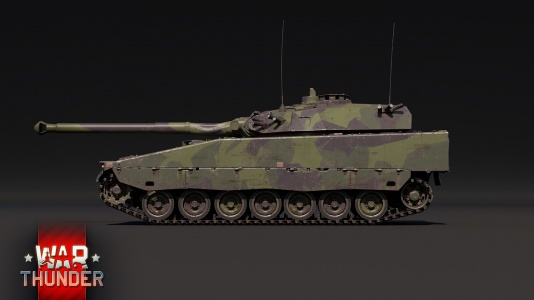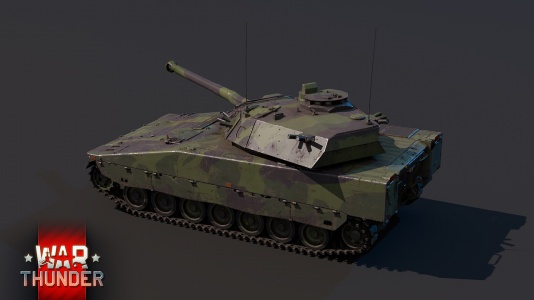CV 90105
| This page is about the Swedish light tank CV 90105. For other versions, see CV90 (Family). |
Contents
Description
The CV90105 light tank was first publicly revealed in 2014. It was jointly developed by CMI Defence and BAE Systems Hagglunds. It was based on the CV90 IFV chassis, which was already combat proven and served with many countries. It used a Belgian Cockerill XC-8 lightweight concept turret, that was already present in the CT-CV 105HP. The concept was also related to the CV 90120, that used the same CV90 chassis and the turret from the AMX-10RC. The tank featured a stabilized 105 mm cannon, with an autoloader and it was meant to be operated in mountainous and urban terrain. An upgraded turret with a 120 mm cannon was proposed by CMI Defence, in order to increase firepower against other main battle tanks.
It was originally introduced as the "CV 90105 TML" in Update 1.97 "Viking Fury" with a Nexter low-profile turret and a similar 105 mm low-recoil cannon, but was almost completely remodelled in Update "Drone Age". The Combat Vehicle 90105 XC-8 is a very powerful light tank. It features a decent armament, and while a 105 mm cannon can be considered underpowered at a BR where most MBTs use 120 mm guns, the CV90105 compensates this with excellent fire control systems. With 2nd generation thermal imaging systems as well as a stabilized commander sight (with its own thermal sight). It also has very decent armour for a light tank, and from the front the crew is very well protected against HEAT warheads and autocannon fire, even from 57 mm autocannons. The mobility is also very good, and it has access to an excellent reverse speed, so it can escape from enemies or change position with ease in the heat of battle.
General info
Survivability and armour
The CV 90105 has 20 mm of frontal hull armour, which is not significant enough to stop anything larger than a 14.5 mm machine gun. But, the upper plate is angled very well and as such could possibly prevent low-penetration autocannons from damaging the vehicle; the hull front, with its slope, can offer from 20 mm on the lower glacis up to almost 90 mm of effective thickness on the upper glacis. The side armour is composed of two spaced plates, one 6 mm and one 10 mm plate (for a total of 16 mm). This is enough to stop low-calibre machine guns, but a .50 cal will penetrate the armour with ease. A fuel tank is located between the spaced armour plates of the left side of the hull, right beneath the turret; the fuel tank is able to absorb machine gun bullets, protecting the turret crew from the left side from machine gun fire. The rear of the hull has a surprising 20 mm of armour, enough to stop low-calibre machine guns.
The turret has 20 mm of all-round base protection. The turret sides and rear have a 5 mm appliqué armour layer, giving a total armour thickness of 25 mm. This is enough to stop machine gun bullets from penetrating. The gun mantlet has 35 mm of protection - enough to protect against some autocannons.
The only part of the vehicle that is vulnerable to heavy machine gun fire is the hull side and rear. The rest of the tank can only be penetrated by autocannons or anti-tank guns. Overall, the armour protection is light. The ammunition of the vehicle is stored in the very back of the hull and turret, and there is a lot of ammunition, so a round hitting there will be hard-pressed to miss the ammunition. Even shots from the front will often lead to ammo rack detonations when it passes through the rear of the tank. The only major source of protection for this tank is the engine and transmission. They are located at the very front, right, of the vehicle. A shot through this portion of the tank will often be absorbed, especially chemical rounds and autocannon shells. If a shell manages to penetrate through the engine block, it must also go through a 10 mm armour plate, which absorbs most of the shrapnel. This increases crew survivability extensively. Besides, even if the engine block absorbs the shot the tank will still be immobilized. Because of the ammunition stowage, the CV 90105 will often die to only one shot. Overall, the armour of the CV 90105 is very thin and should not be relied upon, although it can protect the tank in certain situations.
Armour type:
- Rolled homogeneous armour (hull, turret, cupola)
- Cast homogeneous armour (turret front, gun mantlet)
| Armour | Front (Slope angle) | Sides | Rear | Roof |
|---|---|---|---|---|
| Hull | 20 mm Hull plate over tracks 20 mm (78°) Upper glacis 20 mm (30°) Lower glacis - Upper section 20 mm (41°) Lower glacis - Middle section 20 mm (52°) Lower glacis - Lower section |
6 mm Top 10 + 5 mm Bottom + Side skirts 10 mm (51°) Bottom junction plate |
20 mm (16°) Crew compartment 10 mm Hull plate over left tracks 5 mm Hull plate over right tracks |
20 mm (2°) Front glacis 20 mm (2°) Crew compartment 6 mm (2-12°) Hull over tracks |
| Turret | 35 mm (37-41°) Turret front 20 + 35 mm Gun mantlet 20 mm (2-6°) Optics and MG port 20 mm Turret ring |
20 + 5 mm (37-41°) Left side 20 + 5 mm (20-41°) Right side 20 mm Turret ring |
5 mm (25°) Upper section 5 mm (10°) Lower section 20 mm Turret ring |
20 mm (0-17°) |
| Cupola | 20 mm (0-74°) | 20 mm | ||
Notes:
- Suspension wheels, tracks and bogies are 15 mm thick.
- Belly armour and the bottom plate above the tracks are 10 mm thick.
- Mudguards are 5 mm thick.
- Additionally to the external armour, armour plates are also found inside the vehicle:
| Spaced Armour | Front (Slope angle) | Sides |
|---|---|---|
| Hull | 10 mm (except driver view port) | 10 mm Top |
Notes:
- Inner armour plates protect the sides of the crew compartment (the upper section over the tracks only).
- The engine is separated from the driver position and the crew compartment by an armour plate.
- The driver viewport is a weak spot as it is the only place where the inner armour does not overlap with the external armour.
Mobility
| Game Mode | Max Speed (km/h) | Weight (tons) | Engine power (horsepower) | Power-to-weight ratio (hp/ton) | |||
|---|---|---|---|---|---|---|---|
| Forward | Reverse | Stock | Upgraded | Stock | Upgraded | ||
| Arcade | 78 | 45 | 25 | 1,038 | 1,278 | 41.52 | 51.12 |
| Realistic | 71 | 41 | 593 | 670 | 23.72 | 26.8 | |
With an excellent off-road mobility and a top speed of 70 km/h, the CV 90105 rivals even top tier MBTs, giving the XM-1, AMX-30 Super and Leopard A1A1 L/44 a run for their money. It is also quick to reverse, reaching -43 km/h and has very quick neutral steering. The acceleration is above average and the high hp/ton ratio enables the CV90105 to climb most hills and slopes.
However, the light tank has tendency to fishtail in corners and at high speeds due to the high hp/ton ratio. Even slight steering adjustments at high speeds can spin the vehicle out of control: anticipate your braking phases.
Modifications and economy
Armaments
Main armament
| 105 mm L/50 | Turret rotation speed (°/s) | Reloading rate (seconds) | ||||||||
|---|---|---|---|---|---|---|---|---|---|---|
| Mode | Capacity | Vertical | Horizontal | Stabilizer | Stock | Upgraded | Full | Expert | Aced | Autoloader |
| Arcade | 40 | -10°/+42° | ±180° | Two-plane | 28.6 | 39.5 | 48.0 | 53.1 | 56.5 | 5.00 |
| Realistic | 17.9 | 21.0 | 25.5 | 28.2 | 30.0 | |||||
Ammunition
| Penetration statistics | |||||||
|---|---|---|---|---|---|---|---|
| Ammunition | Type of warhead |
Penetration @ 0° Angle of Attack (mm) | |||||
| 10 m | 100 m | 500 m | 1,000 m | 1,500 m | 2,000 m | ||
| M1061 | HEATFS | 400 | 400 | 400 | 400 | 400 | 400 |
| M393A2 | HESH | 127 | 127 | 127 | 127 | 127 | 127 |
| DM23 | APFSDS | 337 | 335 | 330 | 322 | 314 | 306 |
| DM33 | APFSDS | 408 | 405 | 398 | 389 | 379 | 370 |
| Falarick 105 | ATGM (tandem) | 550 | 550 | 550 | 550 | 550 | 550 |
| Shell details | ||||||||||||
|---|---|---|---|---|---|---|---|---|---|---|---|---|
| Ammunition | Type of warhead |
Velocity (m/s) |
Projectile mass (kg) |
Fuse delay (m) |
Fuse sensitivity (mm) |
Explosive mass (TNT equivalent) (kg) |
Ricochet | |||||
| 0% | 50% | 100% | ||||||||||
| M1061 | HEATFS | 1,174 | 10.5 | 0.05 | 0.1 | 1.27 | 65° | 72° | 77° | |||
| M393A2 | HESH | 732 | 11.2 | 0.1 | 4 | 4.31 | 73° | 77° | 80° | |||
| DM23 | APFSDS | 1,455 | 4.2 | - | - | - | 78° | 80° | 81° | |||
| DM33 | APFSDS | 1,455 | 3.79 | - | - | - | 78° | 80° | 81° | |||
| Missile details | ||||||||||||
|---|---|---|---|---|---|---|---|---|---|---|---|---|
| Ammunition | Type of warhead |
Velocity (m/s) |
Range (m) |
Projectile mass (kg) |
Fuse delay (m) |
Fuse sensitivity (mm) |
Explosive mass (TNT equivalent) (kg) |
Ricochet | ||||
| 0% | 50% | 100% | ||||||||||
| Falarick 105 | ATGM (tandem) | 370 | 5,000 | 24 | 0.4 | 0.01 | 5.09 | 80° | 82° | 90° | ||
| Smoke shell characteristics | ||||||
|---|---|---|---|---|---|---|
| Ammunition | Velocity (m/s) |
Projectile mass (kg) |
Screen radius (m) |
Screen deploy time (s) |
Screen hold time (s) |
Explosive mass (TNT equivalent) (g) |
| M416 | 732 | 11.6 | 16 | 5 | 25 | 50 |
Ammo racks
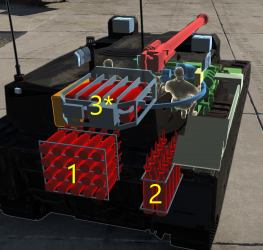
| Full ammo |
1st rack empty |
2nd rack empty |
3rd rack empty |
Visual discrepancy |
|---|---|---|---|---|
| 40 | 21 (+19) | 11 (+29) | 1 (+39) | No |
Machine guns
The small calibre of the ksp 58 machine gun makes it largely ineffective against all armoured vehicles but the ones with an open compartment. It still can be used to ping targets as a rangefinding help.
| 7.62 mm ksp 58 | ||||
|---|---|---|---|---|
| Mount | Capacity (Belt) | Fire rate | Vertical | Horizontal |
| Coaxial | 1,500 (250) | 600 | - | - |
Usage in battles
Mobility
The CV 90105 has great mobility thanks to its powerful engine and light weight. With good top speed, a very quick reverse, good mobility in turns, and very good acceleration, this vehicle's mobility stays competitive even when facing MBTs. With this advantage the CV 90105 is able to take early-game defensive positions, reach sniping locations, and quickly relocate around the map if needed.
Armament
Another one of this vehicle's strengths is its armament. It's equipped with third generation thermal sights in both gunner and commander views, which makes enemies very easy to spot and which is incredibly useful in night battles. This tank also has a scouting ability and access to a scout UAV, which can be used to call for support from teammates and locate enemies on the map.
As for this tank's gun, the CV 90105 is armed with quite a powerful cannon that easily penetrates MBTs. It has access to both DM23 and DM33 APFSDS, and HESH and HEATFS shells. DM33 has over 400 mm of penetration at point blank range and sufficient performance against angled surfaces, so it is recommended as the primary shell against armoured targets. Some HEATFS or HESH shells can also be carried to deal with any lightly armoured SPAA encounters. The gun has a very good turret traverse speed which helps in situations where quick aiming is required, and the 5-second autoloader allows for multiple shots in quick succession. Note however that the CV 90105 is not able to fire once the autoloader has been depleted, and must wait for it to be restocked with a shell.
Survivability
The CV 90105's greatest weakness is its poor survivability. It is only protected by thin armour on all sides. Due to the internal layout of the tank, ammo detonations and single-shot knock-outs are very common. Cannon-calibre rounds are able to penetrate the CV 90105's armour, and artillery and aircraft post a serious threat to this tank. The CV 90105 has effectively no anti-air capabilities and its thin roof armour makes strafing attacks dangerous.
All of this means that avoiding enemy fire must be a priority. The tank's mobility can be used to flank enemies and attack without their noticing. Indeed, engaging head-on is usually a bad idea, since that makes you a prime target for artillery strikes and attacks from aircraft. If there are enemy aircraft nearby, try to stay near cover (next to buildings, under trees, near bushes or rocks...) and avoid crossing open areas of the map.
Pros and cons
Pros:
- Excellent off-road mobility and top speed
- High reverse top speed and quick neutral steering
- Both commander and gunner have access to 3rd generation thermal sights
- Ability to scout
- Two-plane gun stabilizer
- Relatively wide and powerful selection of shells
- Excellent mobility, gives the XM-1, AMX-30 Super and Leopard A1A1 L/44 a run for their money
- Quick turret traverse
- Front mounted engine - can act as a protection screen for the crew
- High hp/ton ratio enables the CV90105 to climb most hills and slopes
- 14 turret mounted smoke shells - fires 4 at a time
- Laser rangefinder
Cons:
- Very thin armour, does not give the possibility to angle or sidescrape
- Vulnerable to artillery and powerful HE shells
- Lack of AA capability makes it vulnerable to aircraft
- Extremely loud engine, if you can just barely hear enemy engines, opponents can definitely hear yours
- No heavy-calibre or roof-mounted machine gun to deal with lightly armoured targets such as the Bradley or BMP-3
- Turret is mounted far back on the hull - needs to show the entire hull when peeking around corners
- Agility at high speeds can make you lose control of the vehicle
- HESH does next to no damage, even to light vehicles
- Huge ammo rack in the rear of the tank - APFSDS shells can enter from the front and still detonate the ammunition at the back of the vehicle
- Only 3 crew members
History
Chassis
The Swedish company Hägglunds began development in 1983 on a combat vehicle capable of both anti-tank and anti-air defence, at the request of the Swedish Army. Due to the nature of the multi-role request, Hägglunds went for a utility vehicle design similar to the ideas of the Swedish Air Force. Initial trials were done with 5 different chassis to determine optimal engineering solutions to the concept. Although the design was unified, trials showed several issues with the clutch and brake systems. This was solved by reconstructing the system altogether. To accompany this, the chassis was raised 35 mm, and tower placement was moved forward. Hägglunds were strictly against this decision but later stated that this adjustment contributed significantly to the great export success of the vehicle.
The XC-8 variant
In 2014, Hägglunds (now merged into BAE Systems AB) and CMI defense showed a new light tank based on the previous CV90 series chassis with Cockerill's XC-8 105HP turret. As well as the capability to be up-gunned to a 120 mm cannon, the new XC-8 turret featured new FCS as well as sporting an autoloader located behind the turret.[1]
Media
- Skins
- Videos
See also
- Vehicles equipped with the same chassis
- Other vehicles of similar configuration and role
External links
- [Devblog] CV 90105 TML with Pre-Order Bonuses
- [Wikipedia] Combat Vehicle 90
- [Army Guide] CV90105
- [MilitaryToday] CV90105 Prototype Light Tank
References
| BAE Systems AB | |
|---|---|
| Light Tanks | |
| CV90 | Strf 9040B · Strf 9040C · Strf 9040 BILL · CV 90105 · CV 90120 |
| MBTs | |
| Strv 122 | Strv 122A · Strv 122B PLSS · Strv 122B+ |
| SPAA | |
| CV90 | Lvkv 9040C |
| See Also | AB Bofors · Hägglund & Söner · KMW |
| Sweden light tanks | |
|---|---|
| L-60 | Strv m/38 · Strv m/39 · Strv m/39 TD · Strv m/40L |
| Strv m/41 | Strv m/41 S-I · Strv m/41 S-II |
| Ikv 91 | Ikv 91 · Ikv 91-105 |
| CV 90 | Strf 9040B · Strf 9040C · Strf 9040 BILL |
| CV 90105 · CV 90120 | |
| Wheeled | Pbil m/40 · U-SH 405 |
| Other | Strv m/31 · Strv 74 · Pbv 501 |
| Finland | Vickers Mk.E · ▄T-26E · BT-42 · ▄PT-76 · CV 9030FIN · CT-CV 105HP |
| Denmark | CV 9035DK |
| Sweden premium ground vehicles | |
|---|---|
| Light tanks | ▄T-26E · Strv m/39 · Pbil m/40 · Strv m/41 S-I · CV 9035DK · CV 90105 |
| Medium tanks | Sherman III/IV · Strv 81 (RB 52) · Strv 103-0 · Leopard 1A5NO2 · Christian II |
| Heavy tanks | ▄KV-1 m1942 · Kungstiger |
| Tank destroyers | Ikv 73 · SAV 20.12.48 · VIDAR |
- Ground vehicles
- Sweden ground vehicles
- Seventh rank ground vehicles
- Premium ground vehicles
- Light tanks
- Gift ground vehicles
- Ground vehicles with smoke grenades
- Ground vehicles with night vision device
- Ground vehicles with thermal sight
- Ground vehicles with autoloader
- Ground vehicles with gun stabilizer
- ATGM vehicles


